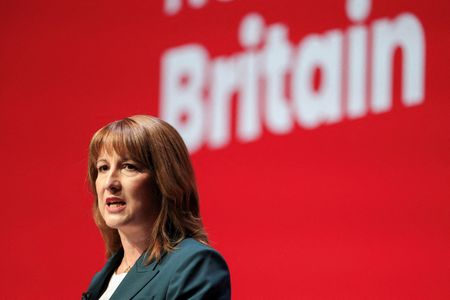LONDON (Reuters) -British finance minister Rachel Reeves is expected to raise tens of billions of pounds in taxes in her November 26 budget in order not to break her self-imposed fiscal rules, a key issue for bond investors.
Reeves said on November 4 that “each of us must do our bit”, raising expectations of tax hikes, while any spending cuts are likely to be small.
Following are options Reeves is considering, according to British media reports, or has been urged to introduce to plug a budget shortfall and to increase buffers against economic shocks.
The National Institute of Economic and Social Research, a think tank, has urged Reeves to come up with 50 billion pounds’ ($67 billion) worth of tax and spending consolidation measures.
INCOME TAX
Reeves and Prime Minister Keir Starmer said before last year’s election they would not raise taxes for “working people”. But on October 29, Starmer declined to commit to the pledge and said the economy was in a worse state than thought.
The Guardian reported on October 23 that Reeves might increase the main income tax rate for all workers by one percentage point to raise an extra 8 billion pounds a year.
The Telegraph said on October 29 Reeves was eyeing a 2 pence rise in income tax rates and a similar cut to social security contributions, which would raise 6 billion pounds by increasing the tax take from pensioners, landlords and the self-employed.
The Times reported on November 6 that Reeves had formally submitted this as a proposal for the Office for Budget Responsibility to assess, and that higher earners might not get reduced social security contributions to offset the tax rise.
Reeves is expected to extend a freeze on the thresholds at which people pay basic and higher income tax rates by two years until 2030, raising about 8 billion pounds.
VAT
Value-added tax could be simplified by ending lower or zero rates for products such as food and children’s clothes. But that could add to what is already the highest inflation among big, rich economies. Tax experts say a lower starting threshold for businesses paying VAT would bring in more revenue and remove a disincentive for growth among small firms.
FUEL DUTY
Successive governments have kept fuel duty frozen since 2011, fearful of protests by drivers. The duty is a big revenue-raiser, bringing in around 25 billion pounds a year, so ending the freeze could boost tax revenues significantly. The Times reported on November 4 that Reeves was considering scrapping a separate temporary relief introduced in 2022.
ELECTRIC CARS
Electric cars will face a new charge of 3 pence per mile driven, equivalent to 250 pounds a year for the average motorist, under a tax that will be announced to take effect in 2028, the Telegraph reported on November 6.
NEW TAXES
Reeves might introduce a new tax, on incomes for example, dedicated to specific spending in an area like public health. Such a move would probably be seen as breaking the spirit of the 2024 pre-election commitment.
THE WEALTHY
Reeves has ruled out a new wealth tax but said on October 15 that higher taxes on the wealthy “will be part of the story”, leading to speculation that she might increase taxes on capital gains and other income sources.
EXIT TAX
The Times said on October 31 that Reeves might impose a 20% tax on wealthy people leaving the country, based on the value of their business assets, similar to taxes in other countries.
PROPERTY
Many economists say a stamp duty tax paid by homebuyers discourages mobility and holds back economic growth. A separate local tax paid by homeowners is based on out-of-date valuations. Reeves might increase taxes paid by owners of expensive homes and reduce stamp duty.
PENSIONS
Options include charging social security levies on pension contributions made by employers to staff or lowering the 25% tax-free lump sum that individuals can take from a pension. Legal & General CEO Antonio Simoes urged Reeves not to deter pension savers. Money managers are reporting a jump in people withdrawing cash from their pensions before the budget.
SAVINGS ACCOUNTS
The 20,000-pound tax-free limit for cash Individual Savings Accounts in the hope of driving more money into the British stock market is likely to be halved, the Telegraph reported on October 25. The Financial Times reported the decrease might be slightly smaller, to 12,000 pounds.
LAWYERS AND ACCOUNTANTS
The Times reported on October 21 that Reeves was considering an increase in tax on people in limited liability partnerships, which are typically used by partners at large accountancy and law firms, triggering protests from professional bodies.
BANKS
Some think tanks have called for higher taxes on banks to claim back some of the billions of pounds of interest that lenders have received on reserves held at the Bank of England. Such a move could hurt lending and slow growth, bankers say.
Reeves said on October 16 she wanted to ensure there was a “competitive environment” for financial services firms.
Tax rises on the sector remained low on the list of options being considered, the Financial Times reported on November 5.
‘SIN TAXES’
Taxes on alcohol, tobacco, gambling and vaping could rise. Other options are air travel, plastics and sugary drinks. Higher “sin” taxes could prompt consumers to change their spending and limit the extra tax revenues. They could also be inflationary.
($1 = 0.7451 pounds)
(Writing by William Schomberg and David MillikenEditing by Aidan Lewis and Hugh Lawson)









